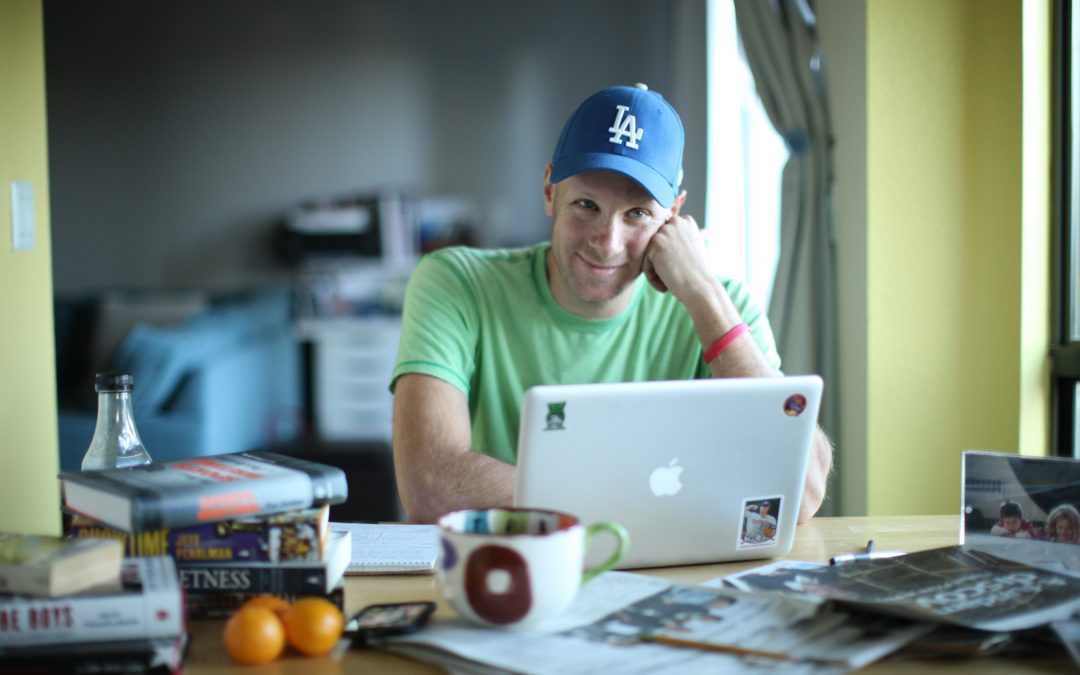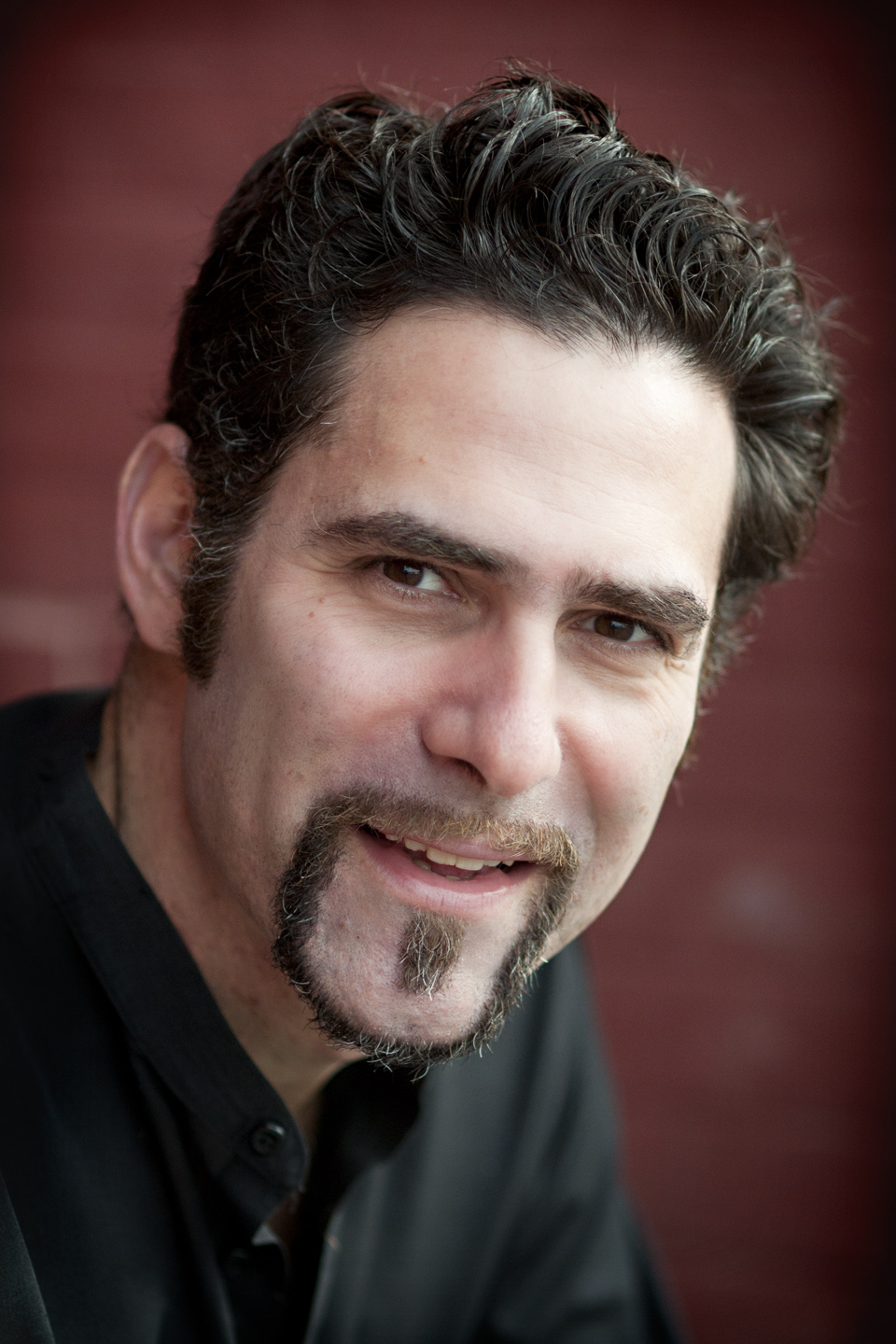`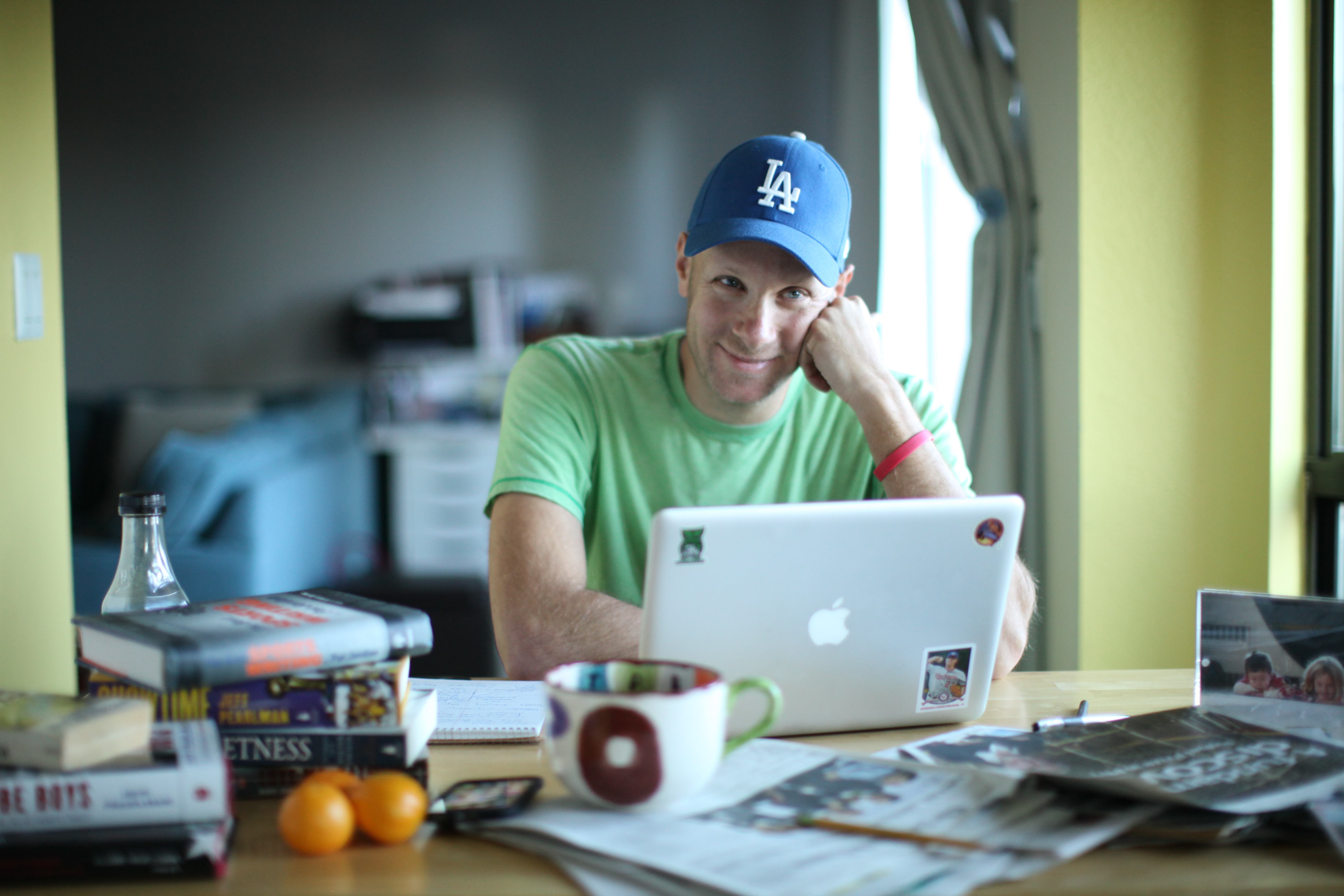 There is a first time for everything, and so today The Open Mic welcomes NYT Bestselling author Jeff Pearlman as its very first return guest. The author of such highly regarded books as “Sweetness” and “Showtime,” Pearlman’s new book takes on Green Bay Packers legend Brett Favre. If you haven’t read it, you should. In addition to being a great writer and reporter, Jeff has a wry sense of humor and is just generally a cool guy. I sat down with him recently to talk about “Gunslinger: The Remarkable, Improbable, Iconic Life of Brett Favre” as well as his next project chronicling the short but memorable life of the USFL and our mutual challenges with social media.
There is a first time for everything, and so today The Open Mic welcomes NYT Bestselling author Jeff Pearlman as its very first return guest. The author of such highly regarded books as “Sweetness” and “Showtime,” Pearlman’s new book takes on Green Bay Packers legend Brett Favre. If you haven’t read it, you should. In addition to being a great writer and reporter, Jeff has a wry sense of humor and is just generally a cool guy. I sat down with him recently to talk about “Gunslinger: The Remarkable, Improbable, Iconic Life of Brett Favre” as well as his next project chronicling the short but memorable life of the USFL and our mutual challenges with social media.
Open Mic: Here at The Open Mic we’re all about process, so let me ask you about the way you did this. In essence you really wanted to write a book about the USFL, but you had to pitch it as doing the Brett Favre book and the USFL book as a pair. Is that correct?
Pearlman: Yeah. I kept bugging my agent about a USFL book, and he finally said “Jeff, nobody wants a fucking USFL book!” I was like “Damn it, I just love this book idea. It won’t sell five copies but it’s a great story.” So I started thinking about how to get it done. I don’t remember how Brett Favre came into my head. But when I did I realized he was iconic, that nobody had written a definitive biography of him yet and enough time had probably passed since the whole ‘retire-unretire’ fatigue. So I just put the two together as a package deal thinking “alright, I could get a lot of money for doing a book on Favre, which would let me take a lot less for doing the USFL book I want to do, and do it in a quicker time than usual.” So, it kind of just worked out that way. I got two deals: one for Favre, one for the USFL thing, both with the same publishing company. And now me and my five friends can expect a USFL book coming out next year.
Open Mic: That fascinates me because there’s so much pressure on authors in this day and age to be more nimble. And we think of it most often with the marketing because even the big houses don’t generally do the kind of marketing they used to do. Marketing now requires so much more effort on the part of the author to get out there and sell the book. So I think that’s a pretty cool way of going about it. Pretty nimble on your feet.
Pearlman: I guess so. I mean I’m going to end up going broke from the sales of that book but at least when I’m living on the street I’ll have a USFL book published in my name and there’s something to be said for that. I don’t know, I just really wanted to do it and to be creative in the approach and try to get a deal. I have an agent, so it was the first time I ever really actively went after a book deal on my own. And I love it. I love the USFL book. It’s hard to do that and promote the Favre book at the same time, but I really love working on this book. I hate the whole promoting process. I love the writing process so all I really want to do is get done with promoting the Favre book and get back to the USFL.
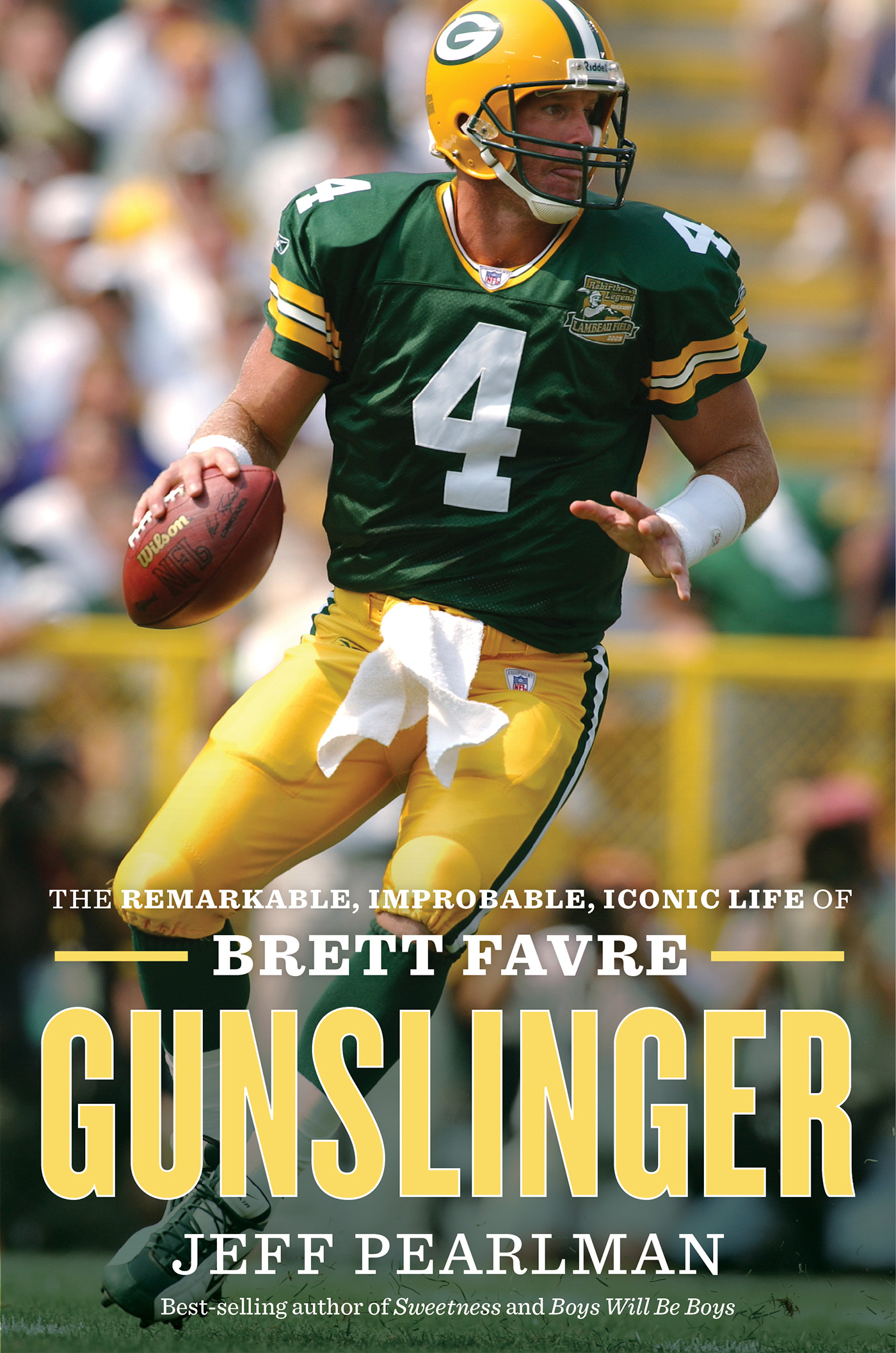
The man, the myth, the legend.
Open Mic: You have been doing lots of promotion for the Favre book, as many as 17 interviews a day along with all the traveling. Those of us who don’t have published books think of how great it sounds to be be on a book tour, but it sounds for you like it’s been really, really hectic.
Pearlman: Yeah, it’s kind of funny. It’s sort of like hearing a Kardashian complain about breaking a fingernail. You can’t complain about having a book and people actually wanting to talk to you about it and promote it. You know like ‘poor me, my book has got to 106 on Amazon,’ you know what I mean? No one wants to hear that. I mean, how many books are published every year in America? How many people dream of writing books? I’ve been able to live this dream, you know? People actually buy the books and I’ve carved a living out of it. So nobody wants to hear you whine ‘oh I have to do 17 interviews in a day, it’s so hard.’ But then you’re telling all the same stories over and over again, and then Aaron Rogers comes and disputes a little thing in the book and you have to deal with that. And I just want to write and report. I like talking to other people about them more than I like talking about myself.
Open Mic: That’s a natural thing for all reporters. You interviewed about 570 people for this book, almost as many as you did for your excellent book on Walter Payton, “Sweetness.” Was there anything else about the process this time around that was different or unique?
Pearlman: The super biggie was the interaction I had with Favre’s family. With Walter Payton I did get to speak to his kids and his brother, but Walter was dead. With this book, it was kind of a mystery whether Favre would help or not throughout because I was kind of led to believe he would. Ultimately he didn’t. But in the meantime, I became Facebook friends with his sister Brandi, who is just a really cool person. I went to Mississippi and asked if she would want to get some coffee, and she invited me to come over to the house. So I go to the house and I spend hours and hours with her and Brett’s mom. And I get Brett’s brother, and I get Brett’s other brother in Erie, Pennsylvania. And I get cousins, and I get nephews. You know like I’ve never had before where the subject didn’t talk but almost all of his relatives did. That was very unique. I was driving away from Bonita’s house one time and I called my wife and I was like, “This is amazing. I just spent four hours with the Favres and they’re awesome.” And she asked, “don’t you think that’s weird?” I’m asked what she meant. She’s said, “Well, he’s not talking but his mom and sister just gave you four hours and sent you home with scrapbooks. How would you feel if someone was doing a book on you and you didn’t talk but your parents gave him all day?” Which is a pretty good point. So that was weird, and was definitely a huge difference.
Open Mic: We tend to be very focused in on the male figure in sports biographies like this, and especially with Favre. I think we’ve all heard the narratives about his father, but you rarely hear much about his mom or about any of the women in his life. But you talk about it a lot, how she instilled some of the softer aspects of his personality. Did you find that to be unique at all?
Pearlman: It is funny with male athletes, especially in professional sports, we always gravitate towards the fathers. It’s this thing we do in journalism because we just presume they were the major role models in their lives. It’s a really dumb presumption. I don’t know why we do it but that’s sort of the story of it all. She was a special education teacher in Mississippi and remarkably understanding and empathetic who had her kids come to her class not just to engage with her students as a way to help those students but to also help her kids understand what people went through, how fortunate they were, and to develop empathy and understanding. And Brett had that throughout his career. There was a special needs guy who worked for the Packers, a guy named Leo Yelle. They had a 41st birthday party for him, and only one player showed up to the party, and that was Brett Favre. Not only that, he used to use Leo Yelle as his name when he checked into hotels. So his mom really gave him empathy and that understanding. The other thing, his dad was unaffectionate and stern and would never – and this is such a cliché – would never tell his kids he loved them or he was proud of them. That was Bonita’s job. She is amazing, she truly is. And she dealt with a lot. Brett’s dad was no saint. You don’t even have to read into that. He was a philanderer, he was a tough guy to be married to, and she just stuck it out for the family. She’s one of the best people I ever met.
Open Mic: Was there anything else that stands out for you as being unique or different or really interesting that you think readers would want to know?
Pearlman: I’ll tell you something I’ve been thinking about a lot and I haven’t expressed because no one’s asked. I had two or three interviews lined up with Brett. He works at a website called Sqor, which is a sort of social media website for athletes. They kept arranging these interviews for me with Brett. I would say, ‘I’m doing a book on Brett, blah blah blah’ and they would say ‘alright, call Thursday at 9:00.’ So I would call at Thursday at 9:00 and I get blown off. I’d call and they’d say he wasn’t there, that he had to reschedule and to call at so and so time on so and so day. And this is going to sound weird but that allowed me – and I wasn’t doing it to be misleading – when I would call people they would ask “is Brett cooperating?” and I would say ‘well I’m scheduled to interview him next Thursday.’ So they kept pushing it back and I kept being able to say “well I’m scheduled to interview him next Thursday” because I always was. As a result, I think people presumed that I probably had more of a relationship with him than I did. I never lied about it or even exaggerated because I always had these interviews that were scheduled. So that’s actually sort of funny.
Open Mic: That is funny. But then he never did actually speak with you?
Pearlman: He sent me a text towards the end. I was sitting in a Starbucks in Florida. I’d initially sent him two actually of my previous two books, but I had heard nothing. And I had the interviews arranged through the website and they never happened, so toward the end I tried one more time. Someone told me he likes audio books so I sent him Sweetness, my Walter Payton book, in audio form which is so ludicrous because it’s like 30 CDs, and who the hell is going to listen to 30 CDs? I sent it anyway with a note. I think I started the note by saying ‘I’m sure you’re annoyed at me by now, or I’m sure you’re pissed at me right now but, blah blah…’ So one day I’m sitting in a Starbucks in Florida and he texts me and the first line was something like “look, I’m not pissed at you, but” and then he explained what he was thinking. I don’t remember the exact words but it was basically along the lines of ‘if I’m going to write a book it will be on my own terms and I don’t feel the need to do this, blah, blah blah blah blah.’
Open Mic: Have you had any response from him or his family since the book has come out?
Pearlman: Well, his nephew Dylan – who’s just a great guy – tweeted the other day, “I don’t read much but I just finished this book on my uncle and I absolutely loved it.” So that was encouraging. I texted Bonita recently, but they’re having a health crisis in the family so she hasn’t been that hyper focused on this. She said she started reading it and didn’t really say much about it. So that’s it. I haven’t heard from Brett. I’d be surprised if I did.
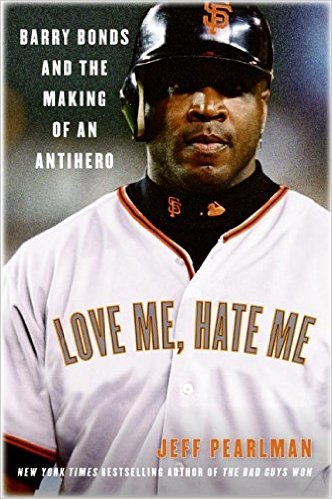
Honestly, I hated him.
Open Mic: Is that the norm?
Pearlman: I think best reaction to any of my books was Barry Bonds. After I wrote the Roger Clemens book, [Clemens] went on Twitter and kind of slammed me. And it never looks good when you do that. But Bonds just completely ignored me. It’s not satisfying if you’re the writer but I think it’s an intelligent way for him to approach a book.
Open Mic: Let me talk to you about the USFL book. You’ve been working on that book while you were writing the Favre book, correct?
Pearlman: Oh, no. I finished the Favre book and then I took a day off. People asked how long I was taking off and I was like, ‘16 hours?’ I took a day off and then I was in a coffee shop down at Dana Point a day later just hard core researching the USFL. Because I don’t have much time. Like I said I’m not getting paid that much for it, at least not enough to make a living, so I gave myself a year, I’ll probably need a tiny bit more time than that because these books usually take two to two and a half years so I gave myself a year. I literally have to talk to 400 people. I’d rather interview more. But I just don’t have the time.
Open Mic: So are you actually in the writing process?
Pearlman: I’m supposed to be but with promoting the Favre book it’s been kind of hard. I’ve only written about 7,000 words of it. I’m in love with this topic, though. It’s the most fun I’ve ever had researching a book. It’s a hard one because the league was only around for three years and it’s all over the place, but as far as research it’s the best. The stories are just fantastic.
Open Mic: And why is that? What was it about the USFL that is so appealing to you?
Pearlman: I was a kid when the USFL came along in 1983. I was turning 11 that year and you know how when you’re a kid – it sounds cliché but I swear to God I’m being a hundred percent forthright – everything seems bigger and brighter? I just remember the USFL coming along and seeing Herschel Walker on the cover of Sports Illustrated in his Generals uniform, and teams like the Oklahoma Outlaws and the San Antonio Gunslingers and spunky uniforms and awesome end zone dances and I just was infatuated. I truly was. I was in love with the USFL. And my senior year in high school we had to write a 20-page thesis about the subject of our choice for English. And I wrote a 40-page paper on the downfall of the USFL. That’s how into the USFL I was. So over the years I’ve just had this league in my head. All the crazy characters and NFL refugees just looking for one more paycheck mixed with these guys from schools like Brown and Bucknell and Duke and their chance to play in pro football, and all of them mixed with great players like Herschel and Jim Kelly and Steve Young and Kelvin Bryant. It was just this buffet of weird. And then you have owners like Trump and John Bassett and the fight with the NFL and TV deals – it’s all just so rich.
Open Mic: What are some of the takeaways so far?
Pearlman: Oh everything. The thing is this, it’s kind of funny. When I talk to the owners and executives they start talking about the business dealings and the blah, blah, blah. That stuff has its place but what really fascinates me, what I’m just blown away by, are the amazing stories. As an example, do you remember the quarterback Joe Gilliam, Jefferson Street Joe?
Open Mic: Yes. We Raiders fans never forget old Steelers.

Over 600 interviews….
Pearlman: He was Terry Bradshaw’s backup [with the Pittsburgh Steelers] and even started briefly. He was one of the first African American quarterbacks in the NFL, out of Tennessee State. So he’d been in and out of rehab when he was signed by the Washington Federals, a really bad team in the USFL. They basically signed anyone with a pulse who’d played in the NFL and so they signed Joe Gilliam, who was at that time living in a halfway house in Washington D.C., He doesn’t have a car, so every day a teammate has to pick up their quarterback from his halfway house for drug rehabilitation and bring him to the stadium, and then bring him back home at night to the halfway house. He’s would be in the locker room smoking cigarette after cigarette during the game; he would smoke cigarettes on the sidelines during games. And that’s like story number 708 as far as my favorite stories in the book. There’s a million characters like that. One of their defensive lineman was Coy Bacon, the old Redskin who was 41 years old and playing for the Washington Federals in front of 17 fans. They couldn’t draw because it rained every Sunday and nobody cared.
Open Mic: And when is that book expected to be out?
Pearlman: I don’t actually know the pub date. It’s due in January, which is a synonym for I am completely and totally screwed. Or it’s a synonym for my November and December are just going to suck this year. I think it’s supposed to come out next winter. But you know, the thing is I’m the only one excited about it. I’m like ‘USFL, USFL’ and my editor, who’s a wonderful person, is like, “Alright, USFL, yay.” [Laughs] So the pre-printing is 17 books. That’s okay, though.
Open Mic: I love that quirky stuff so I’m actually really looking forward to your USFL book.
Pearlman: One question I get a lot is, “you always seem to write about controversial characters and teams.” And it’s like “who do you want me to write about?” Why am I going to do the Ryan Grant biography? Of course you’re going to write about quirky people and funky characters and teams that are dysfunctional. That’s part of the fun of it all.
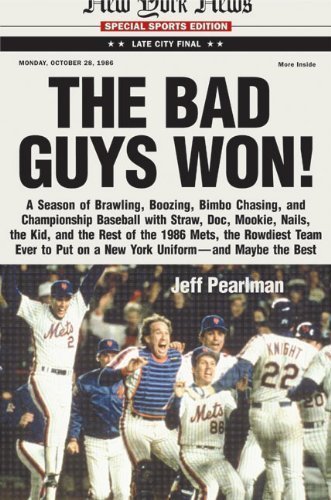
You want quirky? Here you go.
Open Mic: You and I both tend to be a little vocal on social media. Which, as you know, reporters are not always supposed to be. But it’s been very difficult not to be given the political shit show that we’ve been all living though in this country over the last year. Does that give your publishers or your agent any concern? Because you know, all money is green so are they concerned that if you’re too vocal it might cause you problems with book sales?
Pearlman: I’ve never had a publisher or an agent say anything about it, but I have had my wife say something about it and I’ve had my parents say something about it. It’s like that old Michael Jordan quote when he refused to endorse Bill Bradley, he said “Republicans buy shoes, too.” Well, Donald Trump supporters buy books, too. But first of all, I’m unaffiliated professionally so it’s not like I represent a newspaper or magazine. That’s important. Second, I just can’t sit by, I just can’t. I have a little voice and I have 52,000 followers, which isn’t ridiculously large but it’s pretty solid, and I have people who read the blog. And in researching the USFL you see a lot of Trump and you see what a complete and total fraud this guy is. I don’t know how many times I can say it to people. I don’t want Hillary Clinton, I’m not ‘yay Hillary Clinton, she’s the savior.’ I don’t view her that way. But to me, this is between a true con man who has never shown an ounce of empathy or caring for other people versus a political figure who might be a good president. She’s not going to be a disaster. And I just stand by and watch this country hand the keys over to an insane person. And I don’t mean insane person with any exaggeration, I think he’s a narcissistic nut job. I just can’t sit by and watch us hand this thing over to an insane person predisposed to violence. So if that causes me to lose some readers, I’m comfortable with that trade-off.
You can find Jeff Pearlman on Twitter at @jeffpearlman and at his website.

